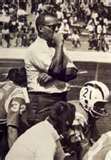 |
| Al Davis (right, holding the Lombardi Trophy) with John Madden |
This scenario is the case with the recent passing of the National Football League's Oakland Raiders owner, Al Davis. His life story offers fascinating events, vivid personalities, dramatic clashes, dark sides, quiet acts of mercy, even brushes with social history. (The LA Times' obit is among the best at relaying some of the texture of Davis' life.) As one who more or less grew up and went well into adulthood during Davis' nearly half-century Raider reign, his biographical arc embraces various sports enthusiasms I had, and in some cases, still have.
 |
| Sid Gillman |
NFL insiders, such as former Dallas Cowboy VP of Player Personnel Gil Brandt, raved about Davis' eye for talent and his vast, detailed knowledge of players and teams. Brandt and Davis appreciated each others' skills, partly as both built franchises with national followings from the ground up. Both Brandt and Davis thoroughly explored small colleges for gold, and were particularly active in the African-American college circuit. Intriguingly, the league, throughout the Raider franchise's best years, did its best to ensure Dallas and Oakland rarely competed against each other in a regular season game. Brandt gracefully notes in his excellent blog post on Davis that the Cowboys were 1-3 against the Silver and Black during Brandt's 29 years with Big D.
When it came to competition, Davis was a purist. He wanted to win, didn't give a damn about anyone else, and would do just about anything within or outside the rules to accomplish that end. Those are reasons why Davis hated parity. In that way, it made perfect sense that Davis was quite friendly with the late George Steinbrenner, for whom parity was absolute anathema. (For the record, I can't stand parity.)
Davis' principal rivals hated his guts and hated his teams. And "hate" is not too strong a word. The feelings were, and remain, visceral. That sensibility is best captured in articles from Denver and Kansas City, franchises from the former American Football League (along with the Raiders). The worst thing the NFL ever did was terminate the New York Jets-Oakland Raiders rivalry during the Joe Namath era. Even today's hot rivalries, such as Patriots-Jets, don't have the same heat as Raider Week does in KC and Denver (Packers-Bears comes close, though.)
 |
| Mean Joe Greene |
Marcus Allen was associated with the Raider's LA years. I think the Raiders' move to Southern California marked their psychic decline. LA seemed more show biz, less down and dirty (a word always associated with the Raiders) than Oakland. Raider players such as Howie Long had one eye toward a media career, and while they played well, the teams lacked their predecessors' profound sense of menace and deceit, traits that started with and were cultivated by the boss.
To get a feel for Davis' personality, read a raw transcript of a 2006 interview Bay Area sports reporter Cam Inman had with the Raider owner. It's terrific, and refreshingly absent of handlers and PR managers. Another personal insight comes from Jerry Magee's engaging remembrance of Davis in signonsandiego.com.
In all interviews and encouters with Davis, it was clear he commanded full control of his enterprise, cherished innovation, and was certain he was the smartest person in the room -- any room. In those ways, he was very much akin to his neighbor across San Francisco Bay -- the late Steve Jobs.
As Dave Anderson said in his adieu to Davis in The New York Times, Davis would "Do or say whatever it took to get what he wanted. The Raiders coaching job. The Raiders general manager job. The (NFL) merger. Control of the Raiders. Three Super Bowl rings. And the Pro Football Hall of Fame, where he's 'the only person....
The one and only."









No comments:
Post a Comment